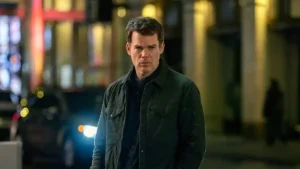Summary
Twilight of the Gods is Zack Snyder through and through. His eye for visuals shines through, but some of his more immature tendencies bog things down.
Twilight of the Gods benefits from Norse mythology’s rich storytelling canvas and colorful characters, from creator Zack Snyder’s eye for striking visuals, and from Netflix’s bottomless pockets funding a stellar voice cast. But the eight-part series — brought to life by Xilam Animation — suffers from Snyder’s worst tendencies, including style over substance and an almost childlike idea of what constitutes “adult” storytelling.
In other words, this is a show that finally answers the question of whether Thor’s curtains match his drapes. The problem is I’m not sure anyone was asking that question in the first place.
Borrowing liberally from some of the more famous aspects of Norse myth, the plot of Twilight of the Gods is essentially a revenge mission that blossoms into all-out celestial conflict. Sigrid (Sylvia Hoeks), a half-giant warrior woman, is due to marry King Leif (Stuart Martin), a ruthless Viking warlord, amongst her family in Jotunheim. Thor (Pilou Asbæk), who was not invited to the nuptials, turns up anyway to needlessly massacre everyone present in search of his brother, Loki (Paterson Joseph), leaving only Sigrid and Leif alive.
Devastated, Sigrid accepts a bargain put to her by Loki to unseat Odin (John Noble) and the other Aesir gods with the help of the Vanir, reigniting an age-old war for control of the Nine Realms. For this purpose, she assembles a crack team including Leif’s captive poet Egill (Rahul Kohli), the mysterious soothsaying prophetess the Seid-Kona (Jamie Clayton) and her wolf-like ally Ulfr (Peter Stormare), and the dwarf forge master Andvari (Kristofer Hivju), who can craft weapons made of God-killing iron.
In the margins of this quite straightforward tale is a bigger one involving Loki trying to avert Ragnarok to spare his children, Fenrir and Jormungandr; indeed, Loki’s nebulous meddling is the real narrative allure, since you can never quite tell what he’s up to and how much of the events we’re seeing are of his design.
You’ll have noticed some of those names. While Hoeks and Martin understandably have the most to do vocally, Twilight of the Gods is quite good about splitting its focus among several characters, and their backstories and subplots are reliably enhanced by solid voice acting. Even very thin parts are surprisingly well-cast. A deadly temptress who doesn’t appear until halfway through is played by Jessica Henwick, and even a largely unimportant farming couple who are around for a single episode are played by Corey Stoll and Lauren Cohan for basically no reason at all.
The cast speaks to a real effort behind this show, and that’s always appreciated. The story is treated with seriousness, not just as a fantastical lark but as a slice of drama with complex human emotions underpinning it. There’s never a sense that anyone involved in this project wanted it to be anything other than the very best series it could be. But one of those people was Zack Snyder.

Twilight of the Gods. Pilou Asbæk as Thor in Twilight of the Gods Cr. COURTESY OF NETFLIX © 2024Cr. COURTESY OF NETFLIX © 2024
Relax — I’m not a Snyder hater. I like 300, which is a worthwhile comparison since it also came prepackaged with its mythology and source material to keep him reined in, and I’m even partial to Man of Steel depending on the day. Twilight of the Gods isn’t as distinctly, self-defeatingly Snyder-esque as his other Netflix projects, like Army of the Dead and the two execrable Rebel Moon movies, and he only personally directs two of the eight episodes (the first and the last.)
But Snyder’s fingerprints are all over this project, and not always in a good way. His eye for a striking image is undeniable, and you can press pause on almost any scene in any episode and find a screensaver-worthy still. The show looking better halted than in motion isn’t his fault; it’s either a testament to his eye for static imagery or an indictment of Xilam, who don’t do anything noteworthy with the animation.
But the preponderance of slow-motion shots, the refusal to let a couple of minutes go by without an action sequence, the apparent inability to dispense exposition in any way other than characters speaking it artlessly aloud, and the near-perverse fascination with “adult” language, violence, sex, and nudity is very Snyder. And it hamstrings an otherwise exciting series by making it offputtingly try-hard.
I’m no prude, but you’ll see what I mean. It’s mostly just irritating, and you can see how almost every sequence would be better if it were a little more restrained. The approach is so distracting that I struggled to focus on the actual story even during its peak moments, my attention always drawn needlessly away to stuff like Thor’s junk or wondering why an alliance should be sealed by drinking breast milk.
Needless to say, this is the stuff that Snyder’s predictably rabid fanbase will eat right up; if he could produce his own breastmilk they’d be the first on the teat. This is why his work is largely critic-proof, and perhaps why so many critics get so frustrated talking to the wall about it. I know how they feel, but I’m more open-minded than most, and I’ve liked enough of Snyder’s oeuvre to keep giving him a chance. Twilight of the Gods doesn’t do enough to convince me that he isn’t a worse filmmaker than his inexplicable popularity would suggest, but if you’re looking for something to wash the stain of Rebel Moon out of your thumbnails, you could certainly do worse.
More on Twilight of the Gods:




